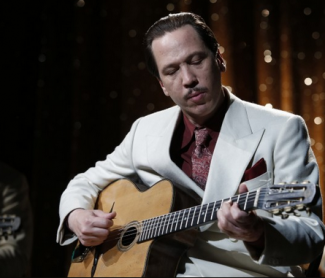Django (Comar, 2017): France
Reviewed by Larry Gleeson as part of the 67th Berlin International Film Festival.
Django, from French helmer, Etienne Comar, was the Opening Night Film for the 67th Berlinale, more commonly referred to as the Berlin International Film Festival and tells the story of legendary musician/composer gypsy-swing jazzman Django Reinhardt. Django is set in France during the German occupation in the years from 1943 to 1945 and backed by strong research, Director Comar delivers an authentic portrait of the artist.
The film opens with a suspenseful rolling of the tiles in blood red accompanied by non-diagetic music. After the titles roll, the gypsy swing music continues as the opening scene reveals a forested, snow-flurried backdrop somewhere in the German Andennes region where a band of gypsies has set up camp. The men are gathered strumming their instruments in a soulful celebration of life. How quickly life changes as the Nazi’s raid the Roma camp. The scene fades as the eldest member of the troop has taken a lethal bullet to the forehead. Two adolescent brothers escaped the gunfire.
Comar forwards to Paris where preparations are being made for a concert performance. However, the lead musician has gone missing. The manager is sent to find and retrieve him. Without much effort, the manager finds a man fishing along a river bank. The man is Django Reinhardt, the film’s protagonist, played delicately by French actor, Reda Kateb, and the manger is his brother. As the brother tries to hurry Django, Django slows the tempo pretending to have a greater interest in the 4 ½ inch juvenile catfish he caught. Nevertheless, Django is whisked back to the theater where his mother, played compellingly by Bim Bam Merstein, awaits admonishing her soon for his tardiness. Django hasn’t a care in the world. He’s above such pettiness. And he goes out on stage and captivates the theater audience with his exquisite and complex musicianship.
The situation, however, quickly changes as the Nazis are using the Paris as the “whorehouse for their army.” Django has a blossoming reputation and the Nazis want a German tour to raise the country’s morale. Yet, they dictate “no more nigger music, dancing in the aisles, no tapping of the feet and no solos longer than five seconds.” Naturally, Django refuses to go on tour, is consequently arrested and spends the rest of the film trying to get he and his family to Switzerland with the help of an admirer, played by the lovely Cecile de France (The Young Pope).
Up to hearing Django Reinhardt for the first time I considered myself fairly astute when it came to jazz. Myself being an avid Django Reinhardt music fan from my first listen when had to ask who was playing the lush syncopated rhythms, I was told by a bewildered SBCC photography instructor, Seantel Sanders, it was Django Reinhardt. Noticing this film about Reinhardt was opening the Berlin Film Festival, I was on a mission to see it. I sat raptured as Comar makes, in many respects, a period piece with spot-on costuming, made by Pascalene Chavanne, tight production design incorporated by Oliver Radot and smooth cinematography provided by Christoph Beaucarne. Warren Ellis handled the music.
Coming in at a surprisingly quick 117 minutes, Django is an exceptional film illuminating a gifted artist struggling with his sensibility regarding the use of his music for political purposes. Underneath, the narrative is a powerful look at the treatment of the Roma camps and their survivability as the German Army closes in. Working off archival materials, Comar delivers a timely piece on gypsy culture and the improvisational skill and unique sounds that emerged and captivated the Parisian club scene during WWII. Warmly recommended.
Photo credit: Roger Arpajou[/caption]
About this entry
You’re currently reading “Django (Comar, 2017): France,” an entry on Student Film Reviews
- Published:
- 02.10.17 / 3am
- Category:
- Berlin International Film Festival 2017, Films

No comments
Jump to comment form | comments rss [?]